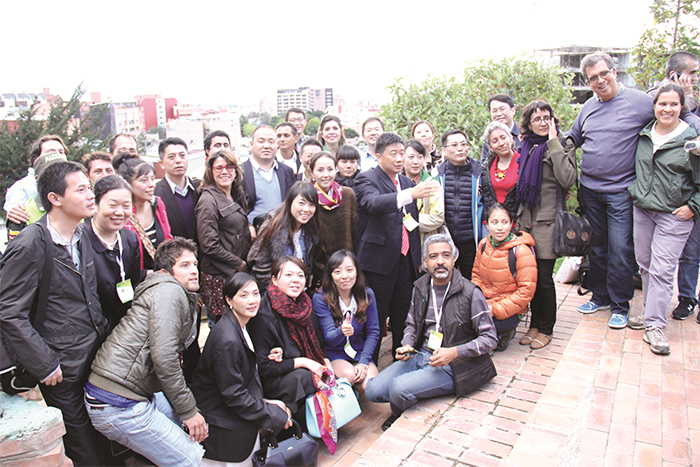Committed to Sustainable Cities and Human Settlements for All
In Special Consultative Status with ECOSOC
HIGH-LEVEL
DIALOGUE
IMPLEMENTING
RIO+20 DECISIONS AND PROMOTING SUSTAINABLE CITIES, TRANSPORT AND TOURISM & GLOBAL
FORUM ON HUMAN SETTLEMENTS 2014
OUTCOME
DOCUMENT
We, the representatives of governments,
agencies of the United Nations System, international organizations, NGOs, city
networks, universities, civil society organizations, businesses, communities,
experts and citizens, assembled in Bogotá, Colombia, from 10 to 12 of August
2014 for the High-Level Dialogue on the "IMPLEMENTING RIO+20 DECISIONS AND
PROMOTING SUSTAINABLE CITIES, TRANSPORT AND TOURISM - GLOBAL FORUM ON HUMAN
SETTLEMENTS 2014":
1. Express our deep appreciation to the
city of Bogotá and to Colombia, their authorities and people, for the
hospitality and organization of this High-Level Dialogue.
2. Recognize that promoting and delivering
sustainable consumption and production is one of the three overarching
sustainable development objectives together with the sustainable management of
natural resources and the eradication of poverty.
3. Recall that today about 3.5 billion
people live in cities around the world and that Latin America and the Caribbean
is a fundamentally urban region, where almost 80% of its population now live in
cities, a region where there are resources and capabilities to drive
sustainable cities that can create growth, improve the use of resources, reduce
pollution and poverty by generating opportunities, access to basic services,
energy, housing, transport and proper planning to meet the requirements of
three dimensions of sustainable development: economic, social and
environmental, in an integrated manner.
4. Affirm that cities are like eco-systems
or living organisms. Cities are much more than infrastructure, houses and
facilities, a sustainable city must cover social, environmental and cultural
aspects in a holistic way, so that investment in people becomes the driver of
growth.
5. Reiterate the necessity for urgently
addressing and promoting resource efficiency, in particular energy efficiency,
use of new and renewable energy in buildings and construction sectors, and
recognize energy as an accelerator to all the other objectives of sustainable
development.
6. Re-affirm that mobility is a fundamental dynamic of urbanization, an associated infrastructure that integrates sustainability and shapes the urban context including roads, transport systems, urban spaces and buildings, which should avoid low-density urban growth and expansion that generates negative externalities such as pollution, noise pollution and accidents, as well as being a cornerstone of participatory spaces and social integration in cities.
7. Recognize that the development of
productive, efficient, and sustainable cities, generating opportunities is a
fundamental condition for overcoming poverty and achieving a decent standard of
living for all, while creating value and jobs through the growing concentration
of economic activities in cities.
8. Re-affirm the importance of social
inclusion in the processes of urbanization and the promotion of sustainable
cities, as well as the importance of ensuring high standards of health for all
citizens through planning and health management, and considering
epidemiological factors derived from climate change.
9. Recall that the core of sustainable
urban development lies in scientific planning and design.
10. Affirm and recognize that all countries
possess a high potential for tourism but presently, tourism is not a
sustainable activity. As the global middle class continues to grow, so does the
demand for tourism industries consequently generating negative environmental
impacts such as the increase in greenhouse gas emissions and a deterioration of
the natural and cultural environments. Therefore it is necessary to include
tourism as one of the five key points in global sustainable consumption.
11. Reaffirm that sustainable development
is everyone's responsibility, and that this should be constructed jointly between
the public, private and civilian sectors at local, national and international
levels, which is required to strengthen global governance and public private
partnerships.
12. Recall that mitigation and adaptation
to climate change must be central and overarching in the post-2015 development
agenda for developed and developing countries, as well as at local and national
levels, in particular through resource efficiency and sustainable consumption
and production, considering the serious threat posed by climate change to gains
obtained in social and economical development.
13. Note the statement of the Seventh World
Urban Forum, in which governments, the private sector, international
organizations, academia, professionals, civil society and other stakeholders
reaffirmed the importance of cities in the new development agenda for post-2015.
14. Congratulate the Open Working Group on
Sustainable Development Goals, for the conclusion of their work by adopting by
consensus the set of 17 Sustainable Development Goals, and recognize and
appreciate the leadership of the National Government of Colombia in this
process.
15. Acknowledge the contribution of the
Global Task Force of Local and Regional Governments for the Post-2015
development agenda towards Habitat III, city networks and cities, in the
formulation of Sustainable Development Goals.
16. Celebrate and support the Urban SDG
#11, that will help local governments and all stakeholders committed with
sustainable urbanization to design, implement and monitor efficient policies
for sustainable cities.
17. Affirm the critical role of local
governments in the formulation and implementation of policies, plans and
programs to implement the international post-2015 development agenda, as well
as the new climate agreement, the new Framework for Action on Resilience and
risk management, and the new urban agenda to be adopted at Habitat III.
18. Insist on the importance of international cooperation, North-South, South-South, triangular, decentralized, technical and financial, and networking, as well as the necessity for Public-Private Partnerships, to achieve sustainable development at local, national and global levels.
We call upon all concerned leaders and decision makers to:
19. Work alongside all development actors
to achieve consistency between the Post2015 Development Agenda and the Climate
Change, Risk and Resilience, Biodiversity, Water and Urban (Habitat III)
agendas, and the integration of climate action in developing strategies
Post-2015.
20. Promote the localization of Sustainable
Development Goals, targets and indicators, which will allow a successful
implementation of the Post-2015 Development Agenda at a local level.
21. Promote appropriate decentralization
processes that create a coherence in national and local development policies.
22. Ensure the adequate and responsible
management of resources in particular energy as a key factor for development,
as it is needed for transportation, commercial and industrial activities, in
construction and infrastructure, for water supply and food production, in view
of reducing the ecological footprint, contributing to climate change mitigation
and adaptation.
23. Induce environment – friendly,
renewable, low-carbon, and efficient energy, that supports communities’
development, through, inter alia, the adoption of tax and fiscal incentives.
24. Further promote public transport,
greener and low carbon transport systems and expand mobility, that support
sustainable community development, by reducing commuting time and inducing
environmentally friendly transport systems, such as walking, bicycles and
electric vehicles, among others.
25. Induce and support the promotion of
greener, low carbon and sustainable built environment, particularly in the
buildings sector, through adequate legislation, market tools, incentives,
information and capacity building.
26. Promote the compact city model, which
lowers the cost of building infrastructure, natural resources consumption and
carbon emissions, contributing to climate change mitigation, while ensuring
liveable communities.
27. Implement special care for historical
town centers, as territories of high social complexity and great cultural and
identity value, revitalizing and renaturalizing them in a participatory manner.
28. Protect environmental goods and
services, ecosystems, agricultural soil, promote efficiency and sustainability
in the use of urban land, ensuring participation and inclusion of citizens in
land use planning.
29. Design and implement integral and
integrated water policies that take into account the regional watershed
approach, the water cycle and adaptation to climate change, including access
and sanitation aspects, management of water demand, resource efficient
consumption, risk-oriented and useful rain water management, conservation and
restoration of hydrological resources, land use and urban planning around water
spaces.
30. Design and implement public waste
policies supported by the following principles: "The best waste is the one
that is not generated" and "Waste is a public resource and can be
managed and profitable." Cities should recycle their waste and transform
it into energy, creating jobs and mitigating climate change.
31. Encourage the creation of decent and
green jobs, with a focus on the inclusion of women and youth, and the
prohibition of child labor in all its forms.
32. Promote sustainability in tourism,
optimizing the use of natural resources, helping the conservation of the
natural and cultural heritage, biodiversity, traditional values and ensuring
economic operations that provide long-term socioeconomic benefits, employment
opportunities, local poverty alleviation, social services to local communities
and enable the development of efficient infrastructure and services that do not
impact the environment. Tourism should be strongly committed to minimizing the
associated social risks such as trafficking in persons, prevention of Sexual
Exploitation of Children (SEC) and to implementing actions on accessible
tourism for disabled persons. Tourism policies and programmes should be
integrated into national development plans and strategies.
33. Design and implement policies for
micro, small and medium enterprises, based on social responsibility to its
workers, the incorporation of clean and environmentally friendly technologies,
access to finance, innovation and the use of information technology and
communications.
34. Develop policies that promote the
public procurement of goods with a low carbon footprint, and promote the
adoption of internationally transparent labeling indicating the origin, mode of
production and the ecological footprint of these products.
35. Underscore that shaping the culture of sustainable development is key to sustainable cities, and induce a sustainability culture and harmony between nature and human beings, supporting and promoting abstemious, resource efficient and healthy lifestyles among citizens, especially the young and children.
Bogota, Colombia





